#or how guil's whole thing about boats is another obvious metaphor for being a character in a narrative
Explore tagged Tumblr posts
Text
Ros & Guil Being Victims of the Narrative Compilation
propaganda for @doomed-bythe-narrative's poll tournament

If you've never heard of Rosencrantz and Guildenstern are Dead, it's a play from 1966 that follows two side characters from Shakespeare's Hamlet. Any other context I'll provide as we go. This post will spoil the whole play, so keep that in mind before reading further. TL;DR these guys are arguably the progenitors of being doomed by the narrative in our postmodern understanding of the concept, and, as much as it sounds like those orv guys deserve the title too, I want my boys to win. Please vote for them.
If you need more than that to be convinced... I'll oblige.
1.
Ros and Guil don't have any solid memories from before the start of the play, at best impressions of memories, because they only exist within the context of the present narrative. They don't get to have pasts because it's irrelevant. They don't even get to know which of them is which (and every other character treats them as interchangeable).


2.
The reason for Ros and Guil's presence in Hamlet is that they're supposed to figure out what's wrong with Hamlet on behalf of the king (because they apparently used to be his friends), but their efforts are unsuccessful. In this play, it's framed as an impossible request -- they get as close as they can get, despite not really understanding a word he says, but get tripped up at the thought there must be more to it than that -- because they were written to fail.

After Hamlet does a murder, their function in the narrative switches to being the ones to bring him to the king, and then to accompany the prince to England where (currently unknown to the two of them) he will be executed. Roles that, as Guil points out, could have been fulfilled by anyone:

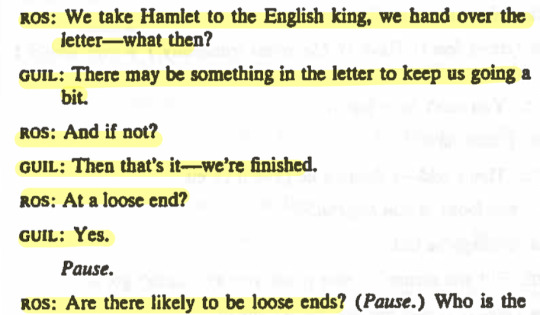
The answer to that last question, is, of course, no. The reason it has to be them is because of how this sequence of events ends: with their deaths.
In short, Hamlet changes the letter with the King's declaration when the pair is sleeping so that they will be killed instead. In the context of Hamlet, this is a key moment for his character (it's his first use of the state violence that's his birthright, and it's a situation he could have gotten out of in plenty of other ways) and for how his bestie Horatio sees him.
But in the context of this show? For as far as Ros and Guil get to know? It is simply what has to happen.

3.
Ros and Guil have no agency over the events of the narrative. When they're not "on stage", they're left in limbo, at the mercy of the other characters' comings and goings.

They try to summon the other characters, because they don't know what to do with themselves otherwise, but nobody comes. Eventually, Ros gets frustrated with this, and then this happens:

When they're "on stage", everything sticks to the script. Even in this example, where Ros and Guil have failed to detain Hamlet and bring him before the King, the world adapts just enough to keep things on track:
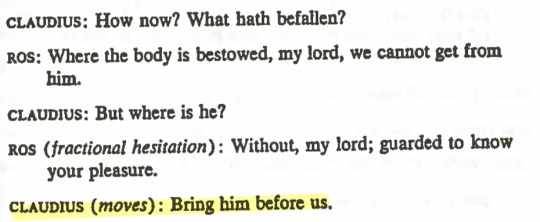

They are at the whims of the narrative.



There's even a dig at how they can't get the ever-passive audience to meaningfully react to them:

They can't escape the bounds of the narrative, even if both of them wanted to.

Any chances they might have had to actually change the course of events come too late, when they're already convinced (arguably more as a coping method than anything else) that their choices don't matter in the shadow of what they've been caught up in.


That last snippet is the conclusion of a bit about how Ros doesn't believe in England because he can't conceptualize it as a place, can't conceptualize his and Guil's arrival there -- which is because it doesn't happen, because England is out of the scope of the narrative and thereby doesn't exist. They can't even imagine a different future for themselves.
4.
There's one other major character in the play: the leader of the traveling players (aka tragedians). He basically exists to prod at Ros and (especially) Guil and explain, in a manner that they can't quite grasp (or refuse to), how they're trapped in a tragedy -- and the cost the two of them will therefore have to pay. As he puts it, in this genre of narrative, "blood is compulsory".
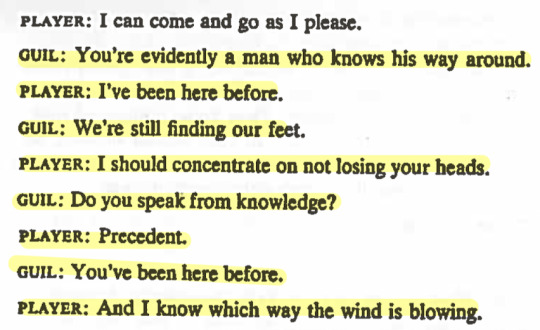
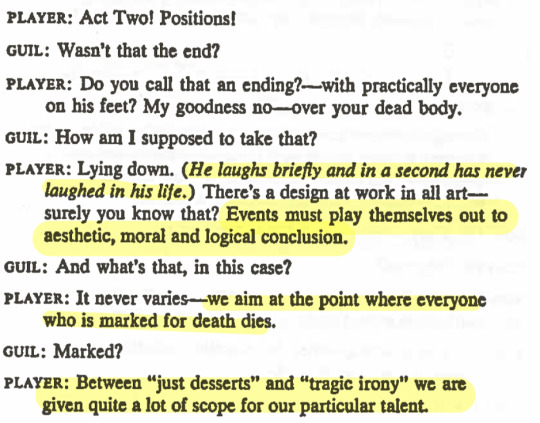
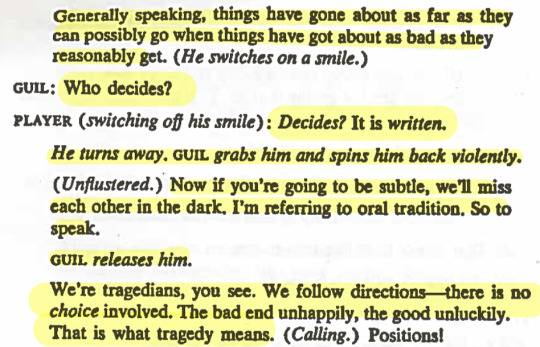

5.
Rosencrantz has this whole monologue in parallel to Hamlet's "to be or not to be" soliloquy about being trapped in a box, which imo is a pretty clear metaphor for being a doomed character in a narrative and whether it'd be preferable to live that existence or to not be part of the narrative at all -- that is, to not exist, to have never been alive.

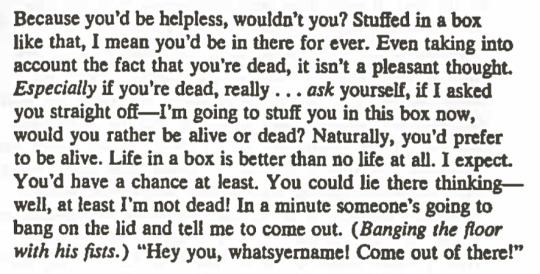
6.
Lastly, the ending. Ros and Guil are sent off with Hamlet on the boat to England. Pirates attack (yes, really, it's what happens in Hamlet too), and the prince escapes with them. Our pair discovers that the letter they were sent with now inexplicably calls for their heads (not knowing that Hamlet switched it).

Guil, at his wit's end, desperate to prove he has some influence, some agency, stabs the Player. But the man gets right back up.
Rosencrantz and Guildenstern face their deaths.
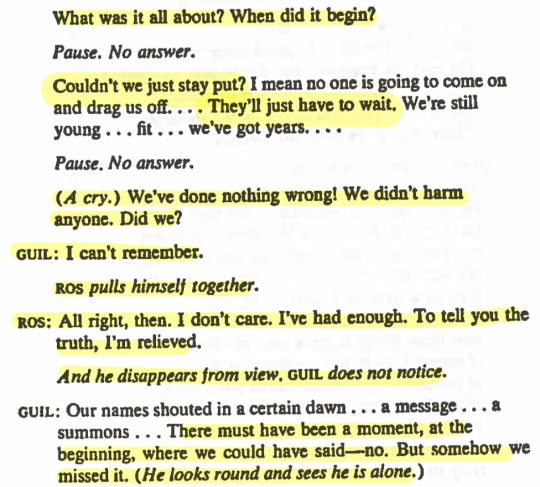
And the worst part of it all?

The promise of "next time". They're in a time loop. Because that's how theater works. Every performance, following from the previous, is them living through these events again. The same exact events, as dictated by the narrative.
They don't remember, loop to loop. Not enough to make different choices. Not enough to say "no".

They won't learn. They won't improve. They won't save themselves/each other. They will do this forever.

And since that gets me basically to the image limit, that's where I'll stop. These bitches (affectionate) are the definition of doomed by the narrative, and it would make very happy if they could at least get past round 1 of the tournament, as stiff as the competition is.
As a closing bonus, take the ending of Act 2 (of 3) of the play, which just. Kills me every time.

#rosencrantz and guildenstern are dead#ragad#doomed by the narrative#narrative nonsense#this took me like. 3 hours. so i do not have the energy to do alt text right now. my apologies#the highlights don't mean anything in the context of this post btw. they're just for me#i didn't even have room here to talk about the coin flipping#or guil and the player's conflict over the nature of death#or how guil's whole thing about boats is another obvious metaphor for being a character in a narrative#there's just so much to this play#y'all should really read it
104 notes
·
View notes